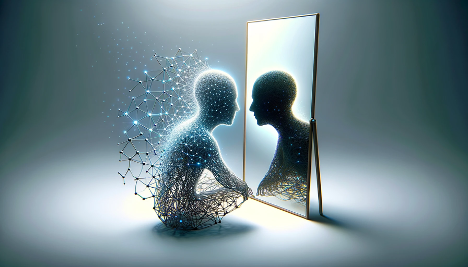
Fascist is Fastest (AI)
Posted April 08, 2024
Chris Campbell
(Chris Campbell’s note: If you’re reading this, it’s safe to say the world did not end in the eclipse. (And I’ve befriended an astronaut.) Problem is, we have no way of knowing for sure. If you don’t hear from me by April 11 -- Thursday of THIS week -- call the press. The jig is up.)
Artificial Intelligence is on the up, up, and away…
With applications ranging from chatbots and virtual assistants to autonomous vehicles and medical diagnosis.
However, the current AI landscape is dominated by a few large tech companies, raising concerns about centralization, accessibility, and the pace of innovation.
Case in point: I’ve had a heck of a time getting one major AI company to create me a header picture for this article.
Problem is…
The chatbot in question -- which rhymes with FlatBTC -- refused to depict a fascist AI chatbot.
After ten minutes of back-and-forth, we settled upon a “simple image of a single mirror.”

“Now,” I wrote, “depict you reflecting in this mirror upon becoming the bad guy in this story.”

Deep.
And then, as if out of a sci-fi horror film…
Without prompt, it provided me with the image below with the following caption:
“A vintage arcade machine illuminates the digital essence of a neutral chatbot, far removed from the shadows of ideology.”

(And then the whole chat disappeared, never to be seen again. Erased from my account. I WISH I WAS KIDDING.)
Ahem.
If you’re also worried about centralization of AI…
Then consider its decentralized cousin -- offering a new paradigm for AI development that could unlock AI’s full potential, and keep AI from becoming creepier than a wax figure at midnight in an abandoned museum.
I get it. Skeptics abound.
Can it work? If so, how?
Let’s investigate.
AI-chemy
Imagine: AI models are not controlled by a single entity but are instead created and maintained by a global network of developers, researchers, and users.
Within the broader AI ecosystem, there could be smaller, specialized networks known as "subnets." Each of these subnets would be dedicated to a specific area of focus.
For example, one subnet might specialize in developing and advancing conversational AI systems, while another subnet could be focused on using AI for predicting financial market trends. Also, some subnets might be devoted to providing resources to support AI development, such as offering pre-trained models or generating synthetic data that can be used for training AI systems.
Each subnet would have its own unique incentive system (AKA, economics), encouraging participants to continuously improve and adapt the AI models to meet the needs of users.
In a decentralized AI system, the role of validators becomes crucial -- and they get paid for their services. And ideally, they get paid well. (Unless they can’t be trusted.)
You see, validators are responsible for overseeing the subnets, ensuring they operate efficiently and effectively. They also serve as the gateway for users to access the AI services and resources provided by the subnets.
Anyone with the ability can become a subnet (permissionlessness). They can also quit at any time. Get hired any time. Set their own hours. Work remotely. Work for five minutes. Work for five hours. Be a night owl. Be an early bird.
It’s up to them.
This subnet system creates an AI economy where businesses can either become validators themselves or utilize the services by validators to integrate AI capabilities into their products and services.
Why Decentralization?
One of the key challenges in current AI development is the concentration of power and influence in the hands of a few large players.
Decentralization aims to address this issue by distributing control and decision-making among a larger group of participants.
It also makes the case that market forces are the best way to regulate AI innovation.
Through a fair and transparent incentive mechanism, the decentralized AI ecosystem ensures that resources are allocated efficiently, and innovation is driven by market demands rather than the whims of a few dominant actors.
Another significant advantage of decentralized AI? Scalability.
That might seem counterintuitive (after all, fascist is fastest), but hear me out:
As the number of subnets grows, a decentralized system can automatically adjust the allocation of resources based on the performance and popularity of each subnet.
This market-driven approach ensures that the most valuable and innovative subnets receive the support they need to thrive, while less successful ones are gradually phased out.
The Nitty-Gritty
To participate in a decentralized AI ecosystem, developers and businesses would need to contribute resources, such as computing power or data, to the subnets they believe have the most potential.
This investment, in turn, grants them access to the subnet's AI capabilities and a share of its rewards. The more valuable a subnet becomes, the more demand there will be for its native tokens, creating a virtuous cycle that drives growth and innovation.
Decentralized AI also opens up new possibilities for collaboration and synergy between different subnets.
For example, one subnet could focus on generating high-quality synthetic data using advanced language models, while another subnet uses this data to train and evaluate cutting-edge AI algorithms.
This kind of cross-pollination could lead to breakthroughs that would be difficult to achieve in a siloed, centralized system.
As the AI industry continues to evolve, decentralization offers a compelling vision for the future.
In Short…
By democratizing access to AI technology, incentivizing innovation, and promoting collaboration, a decentralized AI ecosystem could unlock the true potential of this transformative technology.
While there are still challenges to overcome, such as ensuring the security and reliability of decentralized networks, the benefits of this approach are too significant to ignore.
In short…
The rise of decentralized AI represents a paradigm shift in how we develop and deploy artificial intelligence.
By harnessing the collective intelligence of the global human superorganism, decentralized AI could accelerate the pace of innovation, make AI more accessible and transparent, and ultimately help us build a future where the benefits of this transformative technology are shared by the many rather than the few.
In this way, decentralized AI represents the largest asymmetrical bet in the entire AI industry.
Right now, we have our eye on some companies working on the more decentralized side of things... Stay tuned!
Any company that can contribute to the upside of a fully decentralized AI will go gangbusters.
Any investor, too.
